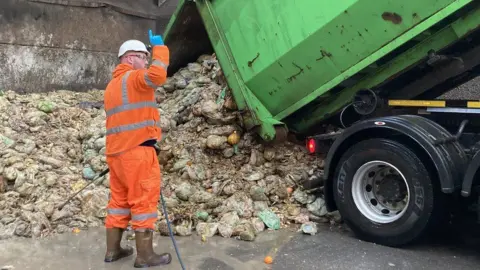Plan to cut bin collections dumped after protests
 BBC
BBCThe trend towards cutting back on bin collections has been bucked by a Welsh council.
Councillors in Neath Port Talbot have been warned that the authority is facing a £23m hole in next year’s budget because of more demands on services, with all departments asked to identify 5% savings.
But members have dumped proposals to pick up rubbish once every three weeks instead of fortnighly, after more than four in five people who responded to consultation objected..
One councillor said they were "listening to the public".
Earlier this year, BBC Wales reported that most of the nation's 22 councils could soon offer one waste pick-up every three or four weeks.
At that time, in February, 10 local authorities - including Neath Port Talbot - collected every two weeks, for another 11 it was every three weeks, and one - Conwy - had monthly pick-ups.
Councils are under financial pressure, and have also been set a Welsh government target that 70% of all rubbish collected is recycled. They face fines if they do not reach that level.
The Neath Port Talbot plan would also have introduced charges for taking garden waste.
A total of £739,000 needs to be cut from the authority's waste and recycling budget.
The decision was made after a public consultation prompted 3,740 responses with 84% of people disagreeing with plans to go to three-weekly collections and 73% of people disagreeing with extra charges.
At the meeting councillor Scott Jones said: “We are listening to the public, taking into consideration the concerns raised by the public during consultation as well as those from the scrutiny and wider council membership.
"I’m not convinced moving to three-weekly collections or implementing a green waste collection charge is the right approach."
Combining paper and card collections was approved, as was the introduction of small electrical item collections.
A report noted eight of the council’s bin lorries need renewing.
Councillors also discussed how they would meet Welsh government recycling targets. They are set to rise to 70% in the 2025/26 financial year.
